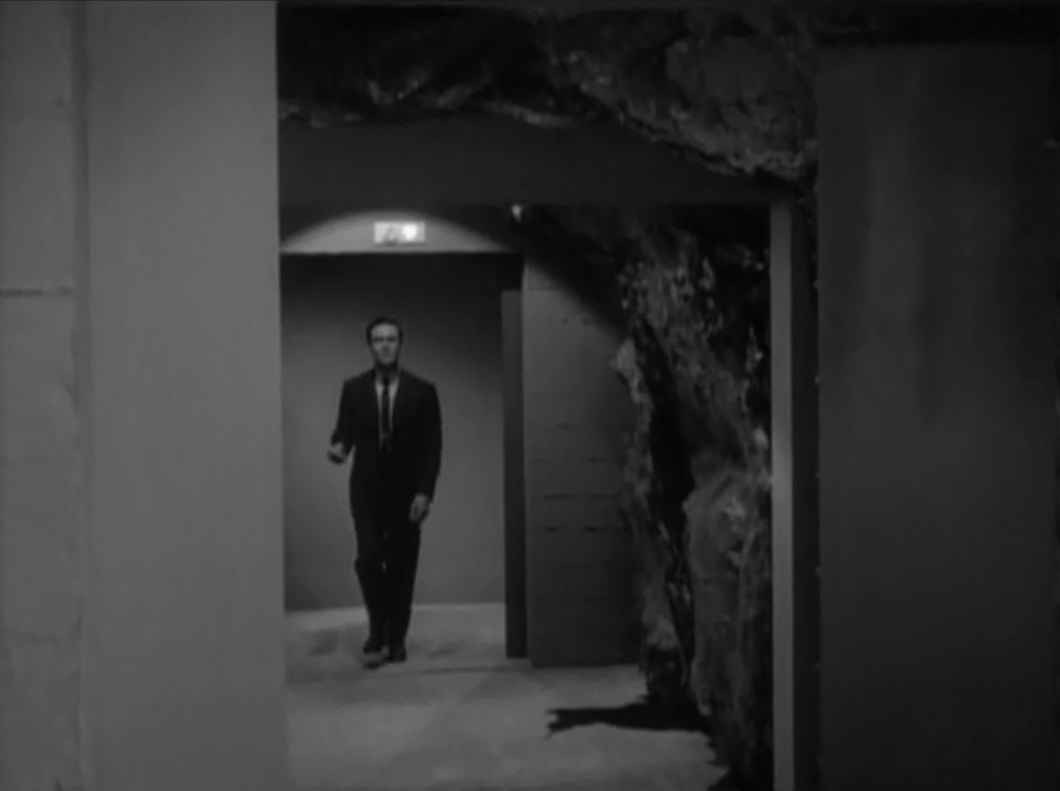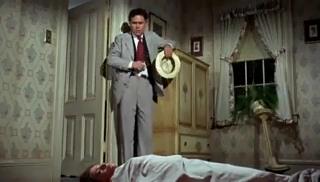The Shelter
The Twilight Zone
Serling’s
Noah has built a bomb shelter, and the construction of the teleplay allows the
revelation of his neighbors’ characters in the face of the great
disaster, which Serling calls off, having made the point.
As directed by
Johnson, this often looks as if it were filmed live with two or more cameras,
with such striking dramatic immediacy that the force of the argument all but
carries itself to a conclusion resembling that of Ibsen’s An Enemy of
the People, and with attendant ironies (including Serling’s famous
call for submissions, which proved unworkable and inundating in the last
analysis).
One of
Serling’s greatest compositions, an example of his fearless surrealism
and at the same time of his hocus-pocus, you have to go back to Nabokov’s
plays in the Thirties to find something quite like this.
The suburban
doctor is feted with a surprise party, something he loathes, and a
“sloppy, sentimental speech” from “a dirty dog” in his
own home. He’s cared for these people over the past twenty years, the
sudden shift is registered on his psyche as a missile attack, they clamor at
him for room in his basement shelter, they should have built their own he tells
them, a battering ram opens the steel door of his defenses, the missiles are
only satellites, their bonhomie returns more or less, he is shattered.
The Ibsen healer
in a plague spot, the equation drawn up for all to see. The famous meeting of
Robert Lowell (“sometimes I feel too full of myself”) and Robert
Frost (“I think how little good my health did anyone near me”).
Five Characters in Search
of an Exit
The Twilight Zone
Beckett’s The
Lost Ones similarly conceives a cylindrical universe. Twice the inhabitants
try to escape by standing on each other’s shoulders, first in a Statue of
Liberty play with the ballet dancer on top (she cannot reach the rim), the
bagpiper, the hobo, the clown and the major, then with the major on top and the
clown on the bottom (the injured ballerina sits this one out). The major hooks
his saber over the rim, climbs up and falls out into the snow, where a little
girl picks up the little doll he is and replaces him in the sidewalk barrel of
the Viewpark Girl’s Home 17th Annual Christmas Doll Drive, cf. Earl Hamner,
Jr.’s “Stopover in a Quiet Town”
(dir. Ron Winston) inter alia.
Nothing in the Dark
The Twilight Zone
Serling goes so
far as to parody Eliot, “what you feared would come like an explosion, is
like a whisper. What you feared was the end, is the beginning...”
As often happens
with Serling, this is mistaken for something else, Albee’s The
American Dream.
The insidiousness
of a wounded policeman demanding succor from an old woman whose tenement home
is threatened with imminent demolition is revealed after twenty minutes or so
when he announces himself as Mr. Death, and after four decades or so by the
legislated sale of television airwaves to accommodate police and fire
communications. “There’s nothing in the dark that wasn’t
there when the lights were on,” Serling warns us.
No useful bids
were actually offered by police and security services at the FCC auction.
One More Pallbearer
The Twilight Zone

The destruction
of New York, “the end of the world”, to provide a savior and a
refuge to his bêtes noires,
“the hydrogen bomb is not an
illusion.” The details of the construction are
absorbingly concentrated and of the utmost interest, the hill not taken in 1942
is from Wyler’s The Best Years of Our Lives, for example. “How incredible all this is...” Coward,
cheat and foist, “not a man who held honor in very high regard” and
now quite wealthy, still bristling at his “humiliations” over the
years since his school days. “All you have to
say is you’re sorry,” a lesson learned in Catch-22 (dir. Mike Nichols), “watch the world being shoveled
into a grave.” Thus Nabokov,
|
because honor and life I weigh on Pushkin’s
scales and dare prefer honor.... |
Rejected even at
the very cost of life (cf. Jack Shea’s The
Monitors), the ruins of his mind are all his compass, the man in the
bunker.
Cf.
most vividly “Time Enough at Last” (dir. John Brahm),
“Nothing in the Dark” furthermore, and of course “The
Shelter”. Serling’s artistic economy
regards a thing from every angle, to leave no stone unturned.
Kick the Can
The Twilight Zone
This highly
complex piece of writing by George Clayton Johnson merits the fullest analysis.
As a study of
melancholy, it takes the divine inspiration of Dürer and directly applies it to
the mystery of Nicodemus. And there is the drollery of its central image, the
game in the title.
Yeats need
perhaps not be mentioned, among the moribunds at Sunnyvale Rest Home.
Four O’Clock
The Twilight Zone
Rod Serling takes
the tiger of lunatic aspersion, propels the story into the Twilight Zone and
having already achieved the impossible, drops the varmint neatly. A man obsessed with evil dreams of a world where all such
are cut off at the knee, and finds himself the tiny gnome of his imaginings,
looked down upon by his pet parrot. “They
won’t be able to handle delicate scientific instruments,” he gloats
over the victims of his would-be two-tier plan. Theodore
Bikel simply rises to this occasion, and so does Linden Chiles as the FBI agent
called in to cooperate.
Hocus-Pocus and Frisby
The Twilight Zone
This great work spins
a tale about a cracker-barrel Munchausen who’s damn near abducted by
aliens, only his harmonica scares them off, just the way his stories beguile
away the melancholy of a small town outside of nowhere.
The genius of it
is, his friends surprise him with a birthday party after his adventure,
it’s just another tall tale to them.
This is
Whitman’s personal universe inhabited by the great disciple of W.C.
Fields, Andy Devine. Aesop is mentioned, but it’s closer to Cool Hand
Luke (dir. Stuart Rosenberg) than anything else, probably. Dwight David
Eisenhower on June 6th, 1944 received counsel of Frisby this side of the French
coast. Pitchville Flats is where the story is laid, bringing to mind the author
firing ideas at sponsors and executives.
The alien craft
is taken for a “movie prop”, their intentions recall “To
Serve Man” (dir. Richard L. Bare), after a salutary punch in the face
their true likeness is revealed as that of the doctors and nurses in “The
Private World of Darkness” (“Eye of the Beholder”, dir.
Douglas Heyes), or the heirs and heiresses of “The Masks” (dir. Ida
Lupino). The harmonica defense resembles the desperate end of Coppola’s The
Conversation.
“The
perfect limit,” Frisby gets called.
Passage on the Lady Anne
The Twilight Zone
An ornate, opulent
steamer of honeymoon couples now aged, on her last voyage (New
York-Southampton).
Two quarreling
American marrieds book passage, find romance and are put overboard in a
lifeboat, well-provisioned, their longitude and latitude sent out to rescue ships.
These are the
terms of the understanding conveyed.
A Covenant with Death

The letter killeth but the spirit giveth
life. “Now will you tremble before the majesty of the law?” A fine
tribute to John Ford’s The Rising
of the Moon, that. “So much for Old World gentility and so much for
Old World ethics.”
After the Great War, not long a State. “All you ever do is make me
nervous!” Johnson’s
City of Soledad (seat of Soledad County) has the precision of a dream.
“Gli occhi di Venere.” Emilio
Fernandez calls his book-learned 22-year-old “princess” a virgin in
disdain, “you better be.”
An early radio announces the death of Pancho Villa, “have you ever heard
such stupidity?”
Bosley Crowther of the New
York Times, “studiously frittered away... a fine idea, instead of
tightening into a hangman's knot, slackens disappointingly.” The very
voice of the lynch mob, that.
Assorted funniment in reviews. TV Guide, “it's an
interesting premise but director Lamont Johnson, helming his first feature, is
unable to pull it off.” Catholic News Service Media Review Office,
“lackuster production lets an intriguing moral-ethical-legal premise get
lost in side issues... morally offensive.” Halliwell’s Film Guide, “dreary moral melodrama”.
The Execution of Private Slovik
A drill sergeant
literally winks at his marksmanship ability and sends him off to the front
line, where he deserts and is shot for it, “with musketry.”
So a civilian in
battle, a sad sack with the first break in his life Stateside, uncomprehending,
inoffensive, useless.
Philip French of
the Observer sees Kubrick’s Paths of Glory and Losey’s King & Country in this, it’s a
situation familiar from Richard Brooks’ Take the High Ground! and Jack
Webb’s The D.I.
The exigency is wartime, the executioners are very loath, almost to a man.
Lincoln
A terrible
judgment is the mise en scène, the dead arise and ask in various tones,
“why hast thou disquieted me, to bring me up?” There is only the
living soul to speak for a man or a woman, and that is how the performances are
defined.
Seward,
Washburne, Stanton, Grant much, Chase some, Douglass, Scott, Keckley, Mrs. Lincoln
and the President, whose Gettysburg Address is an urgent call to arms.